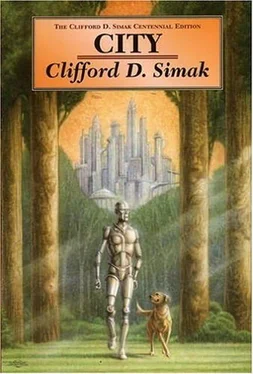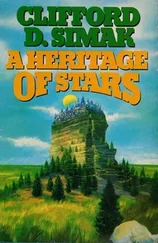Clifford Simak - City
Здесь есть возможность читать онлайн «Clifford Simak - City» весь текст электронной книги совершенно бесплатно (целиком полную версию без сокращений). В некоторых случаях можно слушать аудио, скачать через торрент в формате fb2 и присутствует краткое содержание. Жанр: Фантастика и фэнтези, на английском языке. Описание произведения, (предисловие) а так же отзывы посетителей доступны на портале библиотеки ЛибКат.
- Название:City
- Автор:
- Жанр:
- Год:неизвестен
- ISBN:нет данных
- Рейтинг книги:3 / 5. Голосов: 1
-
Избранное:Добавить в избранное
- Отзывы:
-
Ваша оценка:
- 60
- 1
- 2
- 3
- 4
- 5
City: краткое содержание, описание и аннотация
Предлагаем к чтению аннотацию, описание, краткое содержание или предисловие (зависит от того, что написал сам автор книги «City»). Если вы не нашли необходимую информацию о книге — напишите в комментариях, мы постараемся отыскать её.
City — читать онлайн бесплатно полную книгу (весь текст) целиком
Ниже представлен текст книги, разбитый по страницам. Система сохранения места последней прочитанной страницы, позволяет с удобством читать онлайн бесплатно книгу «City», без необходимости каждый раз заново искать на чём Вы остановились. Поставьте закладку, и сможете в любой момент перейти на страницу, на которой закончили чтение.
Интервал:
Закладка:
Things in the room intruded on his brain, as if they were part of a conspiracy to keep them there. Things that he saw as if he were seeing them for the first time. Old, remembered things that suddenly were new. The chronometer that showed both Earthian and Martian time, the days of the month, the phases of the moon. The picture of his dead wife on the desk. The trophy he had won at prep school. The framed short snorter bill that had cost him ten bucks on his trip to Mars.
He stared at them, half unwilling at first, then eagerly, storing up the memory of them in his brain. Seeing them as separate components – of a room he had accepted all these years as a finished whole, never realizing what, a multitude of things went to make it up.
Dusk was falling, the dusk of early spring, a dusk that smelled of early pussy willows.
The ship should have arrived long ago. He caught himself listening for it, even as he realized that he would not hear it. A ship, driven by atomic motors, was silent except when it gathered speed. Landing and taking off, it floated like thistledown, with not a murmur in it.
It would be here soon. It would have to be here soon or he could never go. Much longer to wait, he knew, and his high-keyed resolution would crumble like a mound of dust in beating rain. Not much longer could he hold his purpose against the pleading of the room, against the flicker of the fire, against the murmur of the land where five generations of Websters had lived their lives and died.
He shut his eyes and fought down the chill that crept across his body. He couldn't let it get him now, he told himself. He had to stick it out. When the ship arrived he still must be able to get up and walk out of the door to the waiting port.
A tap came on the door.
"Come in," Webster called.
It was Jenkins, the light from the fireplace flickering on his shining metal hide.
"Had you called earlier, sir?" he asked.
Webster shook his bead.
"I was afraid you might have," Jenkins explained, "and wondered why I didn't come. There was a most extraordinary occurrence, sir. Two men came with a ship and said they wanted you to go to Mars-"
"They are here," said Webster. "Why didn't you call me?"
He struggled to his feet.
"I didn't think, sir," said Jenkins, "that you would want to be bothered. It was so preposterous. I finally made them understand you could not possibly want to go to Mars."
Webster stiffened, felt chill fear gripping at his heart.
Hands groping for the edge of the desk, he sat down in the chair, sensed the walls of the room closing in about him, a trap that would never let him go.
NOTES ON THE THIRD TALE
To the thousands of readers who love this tale, it is distinguished as the one in which the Dogs first appear. To the student it is much more than that. Basically, it is a tale of guilt and futility. Here the breakdown of the human race continues, with Man assaulted by a sense of guilt and plagued by the instability which results in the human mutants.
The tale attempts to rationalize the mutations, attempts even to explain the Dogs as modifications of the primordial strain. No race, the story says, can become improved if there are no mutations, but there is no word concerning the need of a certain static factor in society to ensure stability. Throughout the legend it becomes abundantly clear that the human race placed little value upon stability.
Tige, who has combed the legend to bolster up contention that the tales actually are human in their origin, believes that no Doggish storyteller would have advanced the theory of mutation, a concept which runs counter to everything in the canine creed. A viewpoint such as this, he claims, must have sprung from some alien mind.
Bounce, however, points out that throughout the legend viewpoints which are diametrically opposed to canine logic often are presented in a favourable light. This, he says, is no more than the mark of a good storyteller – a twisting of values for certain dramatic shock effect.
That Man is presented deliberately as a character who realizes his own shortcomings there can be no doubt at all. In this tale, the human, Grant, talks about a "groove of logic" and it is apparent that he senses something wrong with human logic. He tells Nathaniel that the human race is always worried. He fastens an almost infantile hope upon the Juwain theory as something which might yet save the human race.
And Grant, in the end, seeing the trend of destruction inherent in his race, passes the destiny of humanity on to Nathaniel.
Of all the characters which appear in the legend, Nathaniel may be the only one having an actual historic basis. In other tales which have come from the racial past, the name Nathaniel is often mentioned. While it is patently impossible that Nathaniel could have accomplished all the deeds which are attributed to him in these tales, it is generally believed that he actually lived and was a figure of importance. The basis of that importance, of course, has been lost in the gulf of time.
The Webster family of humans, which was introduced in the first tale, continues to hold a prominent place throughout the rest of the legend. While this may be another piece of evidence to support Tige's belief, it is possible that the Webster family once again may be no more than a mark of good storytelling, a device used to establish a link of continuity in a series of tales which otherwise are not too closely linked.
To one who reads too literally, the implication that the Dogs are a result of Man's intervention may prove to be somewhat shocking. Rover, who has never seen in the legend anything beyond pure myth, thinks that here we are dealing with an ancient attempt to explain racial origin. To cover up actual lack of knowledge, the tale develops an explanation which amounts to divine intervention. It is an easy and, to the primitive mind, a plausible and satisfactory way to explain something of which nothing at all is known.
III. CENSUS
Richard Grant was resting beside the little spring that gushed out of the hillside and tumbled in a flashing stream across the twisting trail when the squirrel rushed past him and shinnied up a towering hickory tree. Behind the squirrel, in a cyclone of churning autumn-fallen leaves, came the little black dog.
When he saw Grant the dog skidded to a stop, stood watching him, tail wagging, eyes a – dance with fun.
Grant grinned. "Hello, there," he said.
"Hi," said the dog.
Grant jerked out of his easy slouch, jaw hanging limp. The dog laughed back at him, red dish rag of a tongue lolling from its mouth.
Grant jerked a thumb at the hickory. "Your squirrel's up there."
"Thanks," said the dog, "I know it. I can smell him."
Startled, Grant looked swiftly around, suspecting a practical joke. Ventriloquism, maybe. But there was no one in sight. The woods were empty except for himself and the dog, the gurgling spring, the squirrel chattering in the tree.
The dog walked closer.
"My name," he said, "is Nathaniel."
The words were there. There was no doubt of it. Almost like human speech, except they were pronounced carefully, as one who was learning the language might pronounce them. And a brogue, an accent that could not be placed, a certain eccentricity of intonation.
"I live over the hill," declared Nathaniel, "with the Websters."
He sat down, beat his tail upon the ground, scattering leaves. He looked extremely happy.
Grant suddenly snapped his fingers.
"Bruce Webster! Now I know. Should have thought of it before. Glad to meet you, Nathaniel."
"Who are you?" asked Nathaniel.
Читать дальшеИнтервал:
Закладка:
Похожие книги на «City»
Представляем Вашему вниманию похожие книги на «City» списком для выбора. Мы отобрали схожую по названию и смыслу литературу в надежде предоставить читателям больше вариантов отыскать новые, интересные, ещё непрочитанные произведения.
Обсуждение, отзывы о книге «City» и просто собственные мнения читателей. Оставьте ваши комментарии, напишите, что Вы думаете о произведении, его смысле или главных героях. Укажите что конкретно понравилось, а что нет, и почему Вы так считаете.











